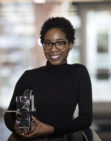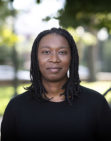PaigeTaul_ReidsRecords.mp4
[00:00:01] David Reid Well I mean back in the day we probably would have, I came back to run the store in the early 1990s. And I believe we had probably had about six or seven employees at that point. And we would have two cash registers going and people would be coming in every Friday after work all through the weekend.
[00:00:23] We had tickets for all kinds of concerts, and you know, Reid's was kind of like the happening place for all the newest music that's coming out. When people were dependent on actual physical product. So we were bustling.
[00:00:39] Christmastime probably would be the busiest time of year. I mean we'd just be from start to finish from sunup to sundown, we would just be swamped in here. People coming from all over the Bay Area. I think Reid's (sigh), I don't think Reid's is so much critical to Oakland or to Berkeley or the Bay Area. I think Reid's story is mostly one of longevity and service. And that a black enterprise can thrive and be supported by the black community, not being reliant on any other. Because I mean if it wasn't for African American clientele here, Reid's would not have existed, and it would not exist today. I mean I was, back in the 90s, I was like the number one choir robe seller for Murphy Cap and Gown in California.
[00:01:38] And, I basically had no white choirs ask me for robes. I mean they wore robes, but they tended to gravitate to where they wanted to gravitate. So its always been probably 98 percent black clientele that have supported this store for 74 years and I think that's, that's, to be commended not by Reid's, but by by our community.
[00:02:05] The neighborhood in the last, I would say, oh goodness since the probably mid-90s has changed dramatically. South Berkeley was basically a black enterprise zone, and a black, basically black neighborhoods. And it has changed, gentrification has taken over. All the most main black businesses have gone and have been replaced by housing or were just not replaced. So it's kind of like the area has gone the way the demographic has changed. Berkeley, South Berkeley, is no longer mainly a black neighborhood anymore.
[00:02:52] It's like I said, it's been gentrified. So there is very few black businesses here that was left.
[00:03:00] Back in the day we had doctors and lawyers and restaurants, of course pool halls. I mean there was things going on up and down the street 24 hours a day. But now it's become very quiet. And culturally very sparse.
[00:03:21] My prayer for future generations is to not make the mistakes, to allow the same things that happened to you that have been happening to my generation and generations previously. African Americans, I know we've achieved a lot of things in a lot of ways but, uh, it's with gentrification, there's no where you can point where we are. I mean if you go to any city nowadays and you go to look Martin Luther King Boulevard. There's none of us there. We don't live there anymore. It's like a tombstone. This is where black people used to be. And I think that's a tragedy.




